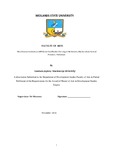Please use this identifier to cite or link to this item:
https://cris.library.msu.ac.zw//handle/11408/1979| Title: | Microfinance Institutions (MFIS) and Smallholder Farming In Mt Darwin, Mashonaland Central Province, Zimbabwe | Authors: | Tambara, Jephrey Muchineripi | Keywords: | Microfinance institutions Rural finance |
Issue Date: | 2016 | Publisher: | Midlands State University | Abstract: | The study focused on evaluating the impact of Microfinance Institutions as a form of rural finance on Smallholder Farming in Mt Darwin district. It explored the different types of Microfinance Institutions present in Mt Darwin and the different services offered, whether the program made any significant impact to Smallholder farming and challenges faced in rolling out such programs. There has been a notion in the development discourse especially by Financial Institutions that it is difficult and risky to finance rural smallholder farmers despite the fact that farmers are prepared to access such funding for productivity purposes. This research thus aimed to navigate more on the financing process as a way of improving the livelihoods of smallholder farmers. According to Yaron et al. (1997), attempts to reduce the gap in the provision of rural finance often focus on supply-side interventions, including government and donor-funded targeted credit programme of the 1950-60s and the global failure which is well cited. Contrary to the expectations of its advocates, liberalisation of financial markets in the 1980s has not succeeded in improving the supply of finance to rural households and enterprises, as formal financial institutions (FFIs) have become more risk averse, having reduced their exposure to agriculture and the rural economy (Tenaw and Helsinki, 2009). Precisely, these are the families that are the first to be ignored by the financial market since they possess few resources, have no collateral, and attract high risks and high transaction costs. The number of these types of families requiring assistance including financial services, which are not determined by the market to secure self-sufficiency in food production, is high in sub-Saharan Africa (Tenaw and Helsinki, 2009). Stimulating food production is therefore desirable in sub-Saharan Africa for poor and marginalized rural inhabitants beyond a market stimulated production level. The informal rural financial service institutions play an important role especially in sub-Saharan Africa as the poor people, particularly women, depend almost exclusively on the informal financial market. Therefore, improving the operational status of the informal sectors is one way out of poverty for the poor rural society in sub-Saharan Africa. | URI: | http://hdl.handle.net/11408/1979 |
| Appears in Collections: | Master Of Arts In Development Studies |
Files in This Item:
| File | Description | Size | Format | |
|---|---|---|---|---|
| Microfinance Institutions and Small holder Farming -Final Tambara.pdf | Full Text | 1.78 MB | Adobe PDF |  View/Open |
Page view(s)
156
checked on Dec 23, 2025
Download(s)
298
checked on Dec 23, 2025
Google ScholarTM
Check
Items in MSUIR are protected by copyright, with all rights reserved, unless otherwise indicated.



